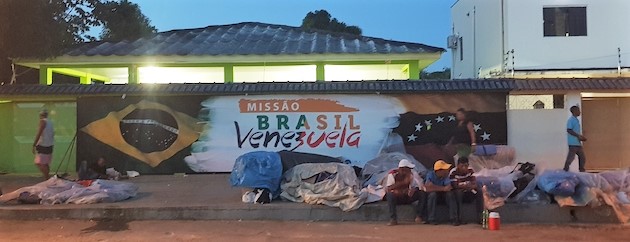A Christian response to the Venezuelan exodus to the Brazilian border
Several faith organizations are working together to help the Venezuelan refugees. Three million Venezuelans have left their country in the last year. “This is the biggest refugee crisis in South America”, the UN says.
BOA VISTA · 14 NOVEMBER 2018 · 10:17 CET

A tragedy is taking place in the limbo of the border cities of Roraima and Boa Vista, where one thousand Venezuelans are crossing the border with Brazil every day to flee hunger and poverty.
They are desperate because they cannot buy food anymore; the price of one single chicken or one table of chocolate is the equivalent of the monthly salary. In the last months, many people could only afford to have one meal a day and their children are suffering from malnutrition.
COMMUNICATION PROBLEMS
In the midst of this crisis, smartphones are among the most expensive goods, a luxury that Venezuelans cannot afford to buy or repair anymore. The lack of this basic 21st century tech is causing an information blackout.
Without mobile phones, thousands of refugees hang around in the streets of Pacaraima and Boa Vista, not knowing what is going to happen to them.
On one hand, they cannot talk with their relatives often, and on the other hand, they do not have easy access to information about Brazil and possible resources to build up their lives there.
BROKEN FAMILIES
Back in Venezuela, it is not possible to make international calls, and in some areas it is not even possible for people to make local calls. Maria, originally from a town not far from Barcelona (Venezuela), has been living for six weeks in the streets of Pacaraima, a Brazilian border city.
She has not been able to reach her children for over a month. The impact of this disconnection has enormous consequences as many families have been forced to flee to neighbouring countries, in order to find food and a job, at the expense of being separated from their loved ones.
CHRISTIANS OFFERING HELP
The migratory pressure on the local population of the isolated border of Roraima is enormous, therefore the environment is increasingly hostile. Violence between locals and refugees has recently erupted.
However, many refugees always mentioned that the Brazilian Christians are helping them. Many of them are camping around the churches, where they usually get food and practical assistance and feel welcomed.
The patio of a Catholic church is now a place where many refugees spend hours waiting for information. The volunteers and people working in the church are overwhelmed by so many refugees asking for help.
This church is also a place where people feel safe, so that they are much more open to talk about their life and experiences, than when you meet them in the streets.
AID NETWORK
There’s a network of religious organizations working together to provide the first-need help to all the refugees in the streets. They receive no support from local, state and federal governments to carry out their activities.
Catholic priest Padre Elvis explained that for first time in the history of this Brazilian region, all the churches are working together to help the refugees. He believes that in the church there are no immigrants, there are Christians.
Another place where many people go for help is the Brazilian-Venezuelan Baptist mission, where they give them water, access to bathrooms and Internet.
But the support that the mission receive from the local community is declining, because Brazilians are tired of seeing their city become increasingly chaotic and insecure.
UN: “THE BIGGEST REFUGEE CRISIS OF SOUTH AMERICA”
Refugees are worried about the change of attitude of the Brazilian population, but at the same time, they emphasize that they have felt welcomed by the Christians of Brazil, and hope to return soon to their country.
However, nothing indicates that the situation in Venezuela will improve in the short term. The humanitarian crisis in this country is reaching alarming levels of misery.
The United Nations just published a report confirming that 3 million Venezuelans have left their country in the last year and declaring that “this is the biggest refugee crisis in South America”.
“Latin America and the Caribbean countries reception capacity is severely strained, requiring a more robust and immediate response from the international community if this generosity and solidarity are to continue”, said Eduardo Stein, UNHCR-IOM Joint Special Representative for Refugees and Migrants from Venezuela.
Published in: Evangelical Focus - world - A Christian response to the Venezuelan exodus to the Brazilian border
